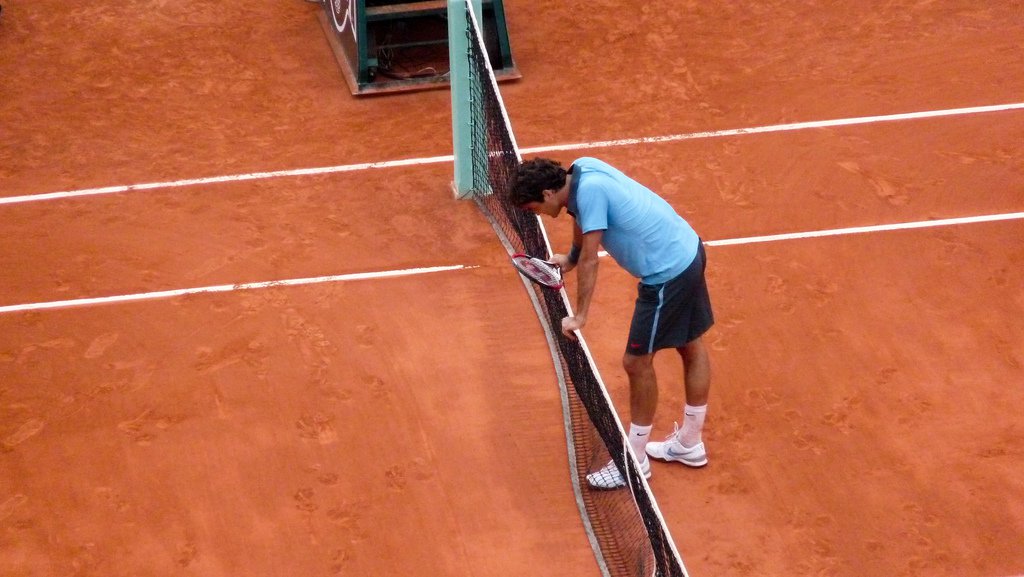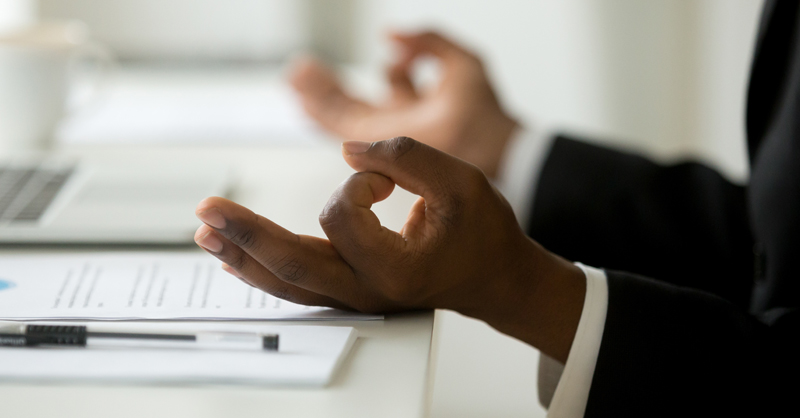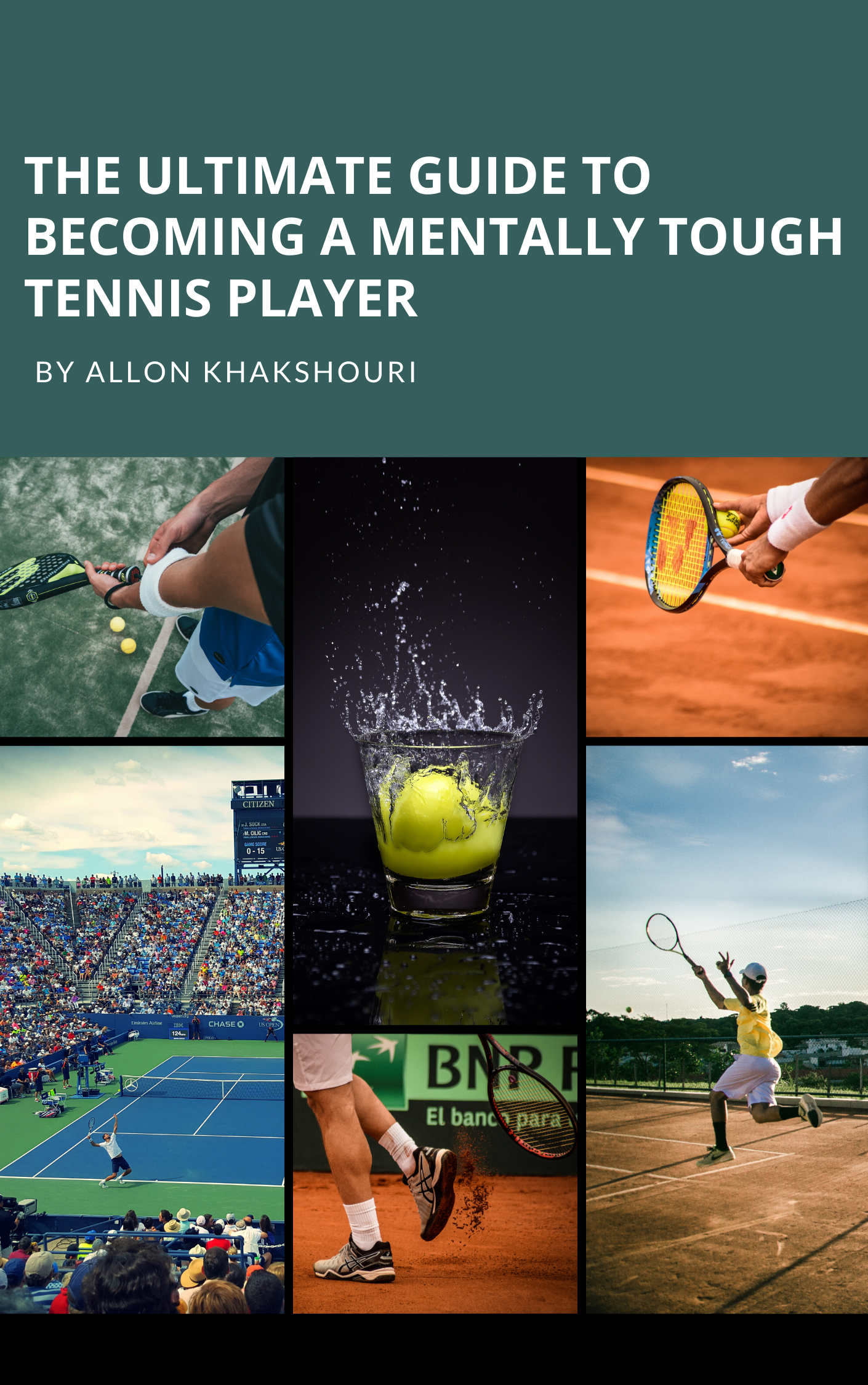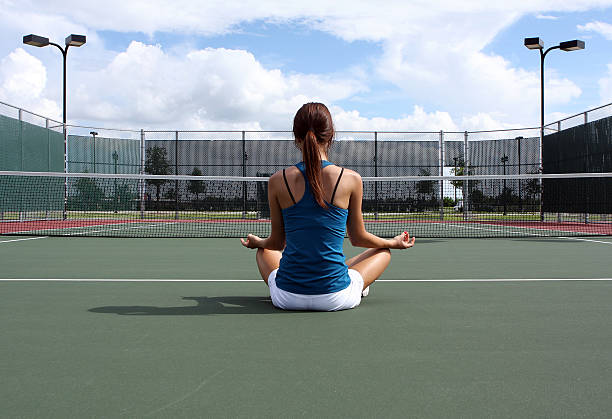Have you ever wondered why it is so hard to play your best tennis when competing at important tournaments?
Or why you become nervous the second you step onto the court even though you practiced well all week?
And finally, how you can stay calmer on the court, so you can play your best tennis?
In this article, I’ll share the exact research that will answer your questions, as well as a proven way to calm your nerves and play your best tennis.
Why do you get nervous before a tennis match?
To find out how competing affects our nerves, researcher Nicolas Rohleder wanted to find out how stressed out ballroom dancers get when participating in a dancing competition.
What he found was despite the fact that these were experienced dancers, stress levels before competing were comparable to someone jumping out of a plane with a parachute!
But why did the dancers feel so nervous before competing?
Rohleder and his team found out that some of the key factors that made the participants of his study so self-conscious when competing, despite their vast experience, included:
- Fearing the feedback from the judges.
- Feeling nervous about being well received by the audience.
- Making a silly mistake that could ruin their performance.
When they practiced, they didn’t experience those feelings. They were just dancing by themselves, or with their teacher.
But as soon as they stepped on the dance floor, the pressure was on, they got nervous, and for some of them, their performance dropped.
Pressure is also why you might play some of your best tennis in practice, but miss easy shots in key moments of important matches.
Regardless of how hard you practice, and how well you play, there is no guarantee that you will play your best tennis during big matches.
It is normal to fear that you won’t play your best tennis when people are watching you, lots of ranking points are at stake, and you worry that you won’t be able to afford your coach if you don’t win at least two rounds.
At the same time, feeling anxious will only make things worse.
You’ll feel more self-conscious before playing important matches, and panic before big points.
You’ll mess up easy chances, or hit unforced errors in the worst possible moments.
And that will make you feel devastated and embarrassed.
You’ll pray that this does not ever happen again, but the fact that it has will make your heart rate beat even faster, and your muscles tighten up, even more, next time you face a bit of pressure.
This is how underperforming below your capabilities becomes a demon that feels impossible to beat!
How world-class players like Djokovic, Federer, and Andreesco handle the pressure?

I can guarantee you one thing:
Regardless of what you do, you will ALWAYS experience moments of pressure.
For me, one of the first forms of pressure was related to doing well in the Swiss school system despite all my learning issues.
I remember how I instinctively knew that studying hard was only part of the deal and that I would enjoy a competitive advantage if I could perform at my best during exams.
So I would often sit still for a few minutes, take a few deep breaths and get myself into a more relaxed state.
When I did this, I felt less nervous and anxious and avoided making silly mistakes. It was my little secret that helped me perform well in exams.
As a competitive tennis player, you will experience significantly more pressure than I did.
Every match is a battle with one winner and one loser - without winning matches you will not improve your ranking, nor cover your expenses.
What separates the best possible tennis players from everyone else is that they are able to embrace pressure-filled moments and play their best tennis when it really matters.
One of the best ways to develop this skill comes from the practice of daily meditation.
Similar to the breathing exercises I did as a kid, meditation will help you relax your body and your mind so that you can perform free from any self-sabotaging thoughts and physiological responses.
This is why it's a habit more and more top tennis players are using:
Roger Federer, for example, once said in an interview that his confidence and precision increased, ever since he regularly started meditating and visualizing himself winning matches and handling pressure brilliantly.
Novak Djokovic once described the benefits of meditation as follows:
“I used to freeze up whenever I made a mistake, Mindfulness helps me focus and turn down the volume in my brain.”
Rising star Biana Andreescu shared after her sensational win at last years US Open:
“My mom introduced me to meditation when I was really young. I was maybe about 12. Ever since then I have been meditating and I do a lot of yoga.
I don’t only work on my physical aspect. I also work on the mental, because that’s also very, very important. It’s definitely showing through my matches where I’m staying in the present moment a lot of the time. I don’t like to focus on what just happened or in the future.”
"How can meditation help you play better tennis?"
Most tennis players still do not meditate- many even believe it's a waste of time.
However, it is the secret weapon that some of the world’s best athletes use to perform at their best in stressful situations.
There are 3 reasons why meditation is so effective for tennis players:
First, meditation will help you increase your focus:

Studies show that meditators are able to suppress distracting thoughts and build the mental strength to focus on what’s in front of you with greater attention and for longer periods of time. This is a crucial skill for tennis players.
Second, meditation teaches you how to stay calm while under pressure:

Studies show that meditators are able to quickly calm themselves down in stressful situations. This ability will help you hit groundstrokes with higher confidence and precision during key moments of your match.
Finally, meditation will help you become more resilient:

In short, meditators are able to let go of negative emotions such as self-doubt, anger, and worry. This allows them to recover from setbacks and disappointments very quickly, and instead focus on seeking solutions.
“How can I sit still and think of nothing?”
When I speak to people, they think meditation means sitting in a weird position for hours while thinking of nothing.
This might be ONE way to meditate, but it’s not the only way, and it's obviously not the right way to get started.
Instead, I recommend you to start with guided meditations.
Guided meditations make meditating easy, as all you need to do is take your phone, put on your headphones and listen to a voice telling you exactly what to do for the next 5-10 minutes.
In addition, you can find meditations that are tailored for athletes and which you can do either sitting down or while taking a walk.
To get started, I recommend you use Headspace.
I began with Headspace and have recommended it to many clients who loved it.
They offer a ten ten-day risk-free trial which is a very pleasant way to get started.
If you like the trial you can subscribe for around 13$ a month and choose from various packages, including ones related to sport.
You can find meditations to help you prepare for a match, to feel more relaxed, to sleep better or to recover from disappointing setbacks.
“What if I don’t have the time to meditate for an hour every day?”
I know what you might be thinking:
OK, this all sounds great, but probably I need to meditate for like an hour every day, and then after like a year I may start seeing some changes.
But the good news is that just several minutes of daily meditation can trigger impressive results!
Zen Master Thich Nhat Hahn offers this short mindful meditation in his book Being Peace: “Breathing in, I calm my body. Breathing out, I smile. Dwelling in the present moment, I know this is a wonderful moment.”
It can be that simple.
Jon Kabat-Zin revealed in his studies that by just meditating for 15 minutes a day, for an 8 week period, we can help us not only improve our moods and reduce feelings of stress but literally strengthen the brain circuits responsible for our attention and focus.
The key takeaway:
Consistency beats length.
Therefore I recommend you start with a very short daily meditations.
“How can I reduce distractions around me?’’
Ideally, you want to find a quiet place where you can meditate daily, without being interrupted.
At the same time, as a tennis player, you will be traveling a lot, so sometimes it can be difficult to find your sacred spot.
In these circumstances, you may need to find a spot, where you can sit still, put on your earphones, and accept that there will be background noises and that people might even interrupt you.
Part of your practice will be to accept distractions from coming and going, instead of resisting them.
“For how long should I meditate every day?”
A famous master was asked how long one should recommend.
His answer:
"20 minutes a day, unless you are very busy. In that case, at least one hour a day."
In other words, the more busy and anxious you feel, the more benefits you will experience from a simple meditation practice.
Having said that, I would start with a short 10 minutes a day, to eliminate any entry barriers and build a habit without feeling overwhelmed.
Over time, you can increase your time to 20 minutes without too much effort, especially if you are reaping the benefits and enjoying some quiet time for yourself.
“What should I be thinking of while meditating?”
The good thing about guided meditations is that they will direct you what to focus on. Of course, there will be moments you may still feel distracted and think of other things.
But that is fine.
There really is no right or wrong way to meditate.
The goal is to find time to chill and relax.
Everyone has random thoughts that pop up while meditating.
Whenever you notice disrupting thoughts circulating your mind, just acknowledge them and then gently try to reconnect to your meditation.
Feeling distracted and reconnecting to your meditation is one of the key aspects of this practice.
“It’s hard for me to get myself to meditate every day. How do I turn it into a habit?”
So you decided to start with meditation:
You sit still and close your eyes, and listen to a guided meditation.
However, you feel restless, and new thoughts keep popping up in your mind.
Even though meditation is simple, it can be challenging to get started.
The goal is not to meditate in perfection, but rather to notice moments whenever you’re lost in thought, so you can return to reconnect with your breathing.
To build this habit you need to commit to a regular practice- I recommend you start with 10 minutes and gradually expand to 20 minutes.
Ideally, you want to meditate at the same place and at the same time every single day and cue your practice with another existing habit.
For example, you may choose to meditate when you wake up, after taking a shower, or before you start your tennis practice.
Initially, you will feel some resistance. Your mind is not used to “stillness”, so you may feel restless and distracted.
Think of meditation as developing a brain muscle that you are growing- it’s a skill that becomes easier with practice.
To hold yourself accountable, you can use the Seinfeld method.
When Seinfeld was asked how he creates so many funny scripts he explained that he would practice on a daily basis. He would track his efforts by using a calendar, in which he would mark a big “X” each day after completing his practice.
His goal was to never break the chain.
In this same way, you can use a calendar and tick off each day after completing your daily meditation.
“What should I do if I keep falling asleep?”
One challenge you might experience is that you keep falling asleep during your meditation. If that happens to you it might mean you actually need more rest.
It may also help to meditate first thing in the morning when you feel fresh and awake.
In addition, try sitting up straight rather than lying down.
“What do I do if I miss a day of meditation?”
You may feel frustrated from time to time that you keep having distracting thoughts. This is one of the main reasons why people end up quitting.
Please be assured with patience meditation is a skill that will get easier and easier for you. With the help of a short daily meditation, you will gradually learn to become more present and enjoy more awareness in your everyday life and on the tennis court
So if you skip a day, don’t make a big deal out of it- the key is to re-commit to practicing regularly so you can build some momentum.
“What should I do after I meditate?”
One of your goals is to feel more present and engaged after your meditation. Therefore you don’t want to get up from your meditation and rush into your daily life.
Instead, take a moment to set an intention for the rest of your day and especially for your tennis practice or match that you have scheduled for the day, and how you want to feel once you step into the tennis court.
“How can I use meditations to play better tennis?’’
I suggest you first focus on building a daily meditation practice.
Once you feel comfortable to meditate, and actually enjoy it, you can pick guided meditations from Headspace that you use before important matches so that you get yourself into your ideal performance state.
You can also start using mini-meditations between important points- and whenever you feel your body tightening up. During such moments, you want to calm yourself down by taking a few deep breaths and focusing on your breathing. This will allow you to get back into a competitive very quickly.
MENTAL WORKOUT: DAILY MEDITATION
If you want to dramatically improve your performance under pressure, building the habit of meditation is a must.
As mentioned, the easiest and most efficient way to start is by using a guided meditation.
With this in mind, I recommend you download Headspace, and start with the free ten-day package. Try one meditation a day for the next ten days, and see if you can feel any difference.
If you want to learn more mental drills and dramatically improve your mental toughness, I recommend you read my Ultimate Guide to becoming a Mentally Tougher Tennis Player.
In this Guide you will learn:
- 13 mental toughness drills that will give you the confidence to fight hard and give your best regardless of the score.
- How to constantly improve your game, love the thrill of competition and become a world-class player by practicing less not more!
- What you need to do in those pressure-filled moments that make you feel so tense you can barely hold your racket!

Get your free PDF copy of my 25,430 words long epic Ultimate Guide To Becoming A Mentally Tough Tennis Player and learn:
13 mental toughness drills that will give you the confidence to fight hard and give your best regardless of the score.
How to constantly improve your game, love the thrill of competition and become a world-class player by practicing less not more!
What you need to do in those pressure-filled moments that make feel so tense you can barely hold your racket!
